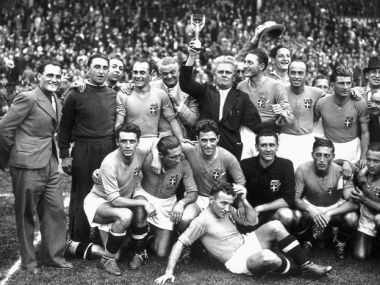FIFA World Cup moments: Italy become first team to win title on foreign soil amidst mounting protests in 1938
Sports’ place in popular culture, over the years, has remained understated but unchallenged, and modern sporting history is replete with instances where the game has transcended field of play and became an instrument of symbolism. Long before USA and Russia asserted their soft power on chessboard, and much before India and Pakistan vied for jingoistic supremacy in hockey and cricket, the football World Cup in 1938 became Mussolini’s cause célèbre to foster a farcical sense of nationalism among Italians.

Italy's 1938 World Cup-winning team. AFP
The context is unmissable: A nation coming to terms with the losses that war entails, a society witnessing the rise of a fascist regime, a team out to defend its title. Italy entered the competition, hosted by France, as one of the favourites, but the focus, for better part of their campaign was on the regime that Vittorio Pozzo’s men represented. Pozzo, the Azurri coach, used military-style training methods to prepare his team for the event, besides taking his men to a World War I cemetery in Redipuglia to remind them of the sacrifices of their forefathers.
Widespread protests greeted the team in Marseille, which had a significant concentration of exiled Italians. The team, on their part, did little to dispel the cloak of unpopularity that hung over them like a spectre. There were raised-hand salutes that irked the crowds, subtle intimidation that lent them mystique, and irrepressible pace that made them a nightmare for the opposition.
The defending champions had won the Olympic gold just two years earlier, and had entered the competition on an 18-match unbeaten run. Their first match though was a bit of an anti-climax as they laboured passed Norway 2-1 in extra time amid jeers from an estimated 10,000 Italian exiles. The match itself is remembered for Pozzo ordering his team to perform the fascist salute twice, a move that ticked off the protestors who had already expressed their dislike for Italian players sporting the fascist symbol Fascio Littorio — bundle of sticks and an axe — on their shirts.
The team, though, hit the straps in the quarter-final against France, with Silvio Piola scoring two second-half goals in a 3-1 victory. However, as was the case in their tournament-opener, this match too is remembered for its symbolic overtones.
Back then, France and Italy both played in blue shirts, and a draw of lots was used to decide which team would change theirs. Italy lost, but instead of wearing white — the traditional change colour — they turned up in black. It was the first time that maglia nera (black shirt) made an appearance in an international match and this time, the Fascio Littorio was far from subtle. Buoyed, no doubt by this open defiance, Italy turned in their best performance of the competition to silence the hostile crowd.
Brazil were the next to fall and the 2-1 win took Azurri to the final against Hungary. Before the final, the team purportedly received a letter from Mussolini with a simple credo, “Win or Die.” That was hardly a tough choice, and Italy dazzled Paris’ Stade Olympique de Colombes with some inspirational football. With scores tied 1-1, Italy scored two goals in 20 minutes to magically turn the crowd in their favour. Hungary pulled one back but Piola found the net one last time to seal the final with a commanding 4-2 verdict.
Antal Szabo, Hungary's goalkeeper, later remarked in reference to the alleged Mussolini telegram, “I may have let in four goals, but at least I saved the lives of 11 men.”
Each member of the World Cup-winning squad was rewarded with an 8,000 Lire win bonus (about three months’ salary) and a fascist gold medal, which was presented by Mussolini during a 15-minute reception at the Palazzo Venezia in Rome. It was the first time a team had won a World Cup on foreign soil and Italy's 1934 and 1938 teams also became the first to have won two World Cups under the same coach.

No comments:
Post a Comment